|
|
|
Sort Order |
|
|
|
Items / Page
|
|
|
|
|
|
|
| Srl | Item |
| 1 |
ID:
114263
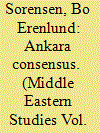

|
|
|
|
|
| Publication |
2012.
|
| Summary/Abstract |
Over the past decade scholarly consensus has moved away from viewing turmoil in Turkey as a product of religious-cultural incompatibility with modernization. Instead, scholars have shown that the rise of an Islamic elite has expanded democracy in Turkey, while often vexing the secularist elite. This article reviews the most important of the new scholarship, but criticizes it for inheriting the assumption that all events in Turkey somehow hinge upon Islamist-secularist antagonism. Alternatively, insights from sociology are employed to argue that domestic Turkish discord is intimately related to industrialization and democratization, and that excessive attention to supposedly religious conflict blinds much contemporary scholarship to the intolerant Sunni-Turkish nationalism cultivated by the Turkish state.
|
|
|
|
|
|
|
|
|
|
|
|
|
|
|
|
| 2 |
ID:
114261
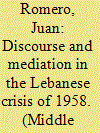

|
|
|
|
|
| Publication |
2012.
|
| Summary/Abstract |
The Lebanese constitutional crisis and civil war of 1958 were caused by a combination of domestic and international factors such as Arab nationalism, Cold War strategic thinking, and the Lebanese President Camille Chamoun's unpopular intention to amend the constitution to enable him to stand for re-election. This article argues that the crisis was resolved primarily thanks to the efforts of moderate Lebanese politicians and religious leaders. American mediators were involved in mediation attempts, but their contribution to the resolution of the conflict was made possible by the continuous efforts of the Lebanese themselves.
|
|
|
|
|
|
|
|
|
|
|
|
|
|
|
|
| 3 |
ID:
114257
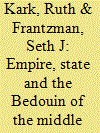

|
|
|
|
|
| Publication |
2012.
|
| Summary/Abstract |
The Bedouin of the Middle East have been one of the region's most marginalized groups in modern times. This study assesses the interplay between state policies and the Bedouin in the last 150 years, from a comparative standpoint. We examine the development of land laws in the Middle East as they have affected the Bedouin, from the enactment of the Ottoman land laws of 1858 up to the present. Moreover we explore whether the land laws and the fate of the Bedouin are associated with the characteristics of the regime in each country. We find that the imposition of land laws and policies directed at nomadic and sedentarizing Bedouins has depended on disparate factors such as the origins of the leadership of countries (i.e. Bedouin or non-Bedouin) and the social and economic models embraced. Regimes with origins in the tribal-Bedouin fabric of the Middle East have pursued land policies that were favorable to the Bedouin, whereas regimes drawing their strength from urban elites and with socialist outlooks encouraged very different policies. We also consider whether the case of the Bedouin in Israel is unique or reflects a larger regional context.
|
|
|
|
|
|
|
|
|
|
|
|
|
|
|
|
| 4 |
ID:
114262
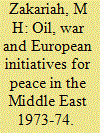

|
|
|
|
|
| Publication |
2012.
|
| Summary/Abstract |
The Arab-Israeli wars since 1948 resulted in several peace treaties between Israel and its neighbours brokered by the US, the Soviet Union and European countries in an attempt to achieve a just and lasting peace settlement in the Middle East. All efforts however proved ultimately futile, with the resumption of war several years after each peace treaty had been signed. For example, after the Six Day War of 1967, all parties agreed to accept a peace treaty based upon United Nations Resolution 242. However, six years after the tabling of the resolution, war broke out again on October 1973. Another long process of peace settlement ensued which culminated in the Camp David Accords, brokered by President Jimmy Carter. These peace accords, signed between President Anwar Sadat of Egypt and Menachem Begin of Israel on 17 September 1978, led directly to the Israel-Egypt Peace Treaty of 1979. Despite its success, the 1979 treaty yet again failed to achieve the just and lasting peace settlement that had been expected. In all these treaties, the core issues of the conflict, such as the Palestinian refugee problem and the status of East Jerusalem, failed to be resolved. This article examines the British attitude and perspective towards the peace settlement after the 1973 war, focussing on the proposal for an International Peace Guarantee and the initiative of the Euro-Arab Dialogue. Based upon declassified archival records of the Foreign and Commonwealth Office available at the National Archives in England, it unveils the attitude of the British government towards the UN Resolutions as well as its collective initiatives with the European Community to establish a just and lasting peace settlement in the Middle East.
|
|
|
|
|
|
|
|
|
|
|
|
|
|
|
|
| 5 |
ID:
114264
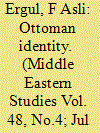

|
|
|
|
|
| Publication |
2012.
|
| Summary/Abstract |
It is awkward for historians to depict a clear-cut portrayal of Ottoman identity. Scholarly analyses by and large lay emphasis on the Islamic and Turkish character of the Ottoman Empire. However, it would be reductionist to evaluate an empire that lasted for six centuries, on three different continents, with solely monolithic ethno-religious tools. A new approach around the term Rum may help to get rid of this reductionism and to understand the sui generis structure of the Ottoman identity. Instead of focusing on ethnic and religious aspects, this novel approach would add both a territorial dimension of Ottoman hegemony and also a social component regarding the relations between the rulers and the ruled. The Rum, with a meaning above Orthodoxy, Greek or Roman Empire, can highlight the ingredients of Ottoman identity and help to overcome the influence of modern nationalist discourses in historical readings.
|
|
|
|
|
|
|
|
|
|
|
|
|
|
|
|
| 6 |
ID:
114258
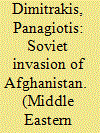

|
|
|
|
|
| Publication |
2012.
|
| Summary/Abstract |
From the outset the Soviet invasion of Afghanistan was strongly condemned by Britain and all the other NATO member states, by the non-aligned group and by key countries in Asia and the Middle East. During the first days following the invasion, London worked for the speedy build-up of a diplomatic consensus, while the Carter administration was still in a state of surprise and some confusion. It is evident that the single factor that led many countries to join forces diplomatically was the fear of further Soviet adventurism in Asia and the Middle East; uninformed, alarmist assessments of Soviet intentions played a major part in cementing a diplomatic coalition, which led to the condemnation of Moscow in the UN General Assembly - predictably, the Soviets had vetoed a Security Council resolution. Simply put, the fear of war led to something of a panic among non-aligned nations, which in turn convinced them to back western diplomacy.
|
|
|
|
|
|
|
|
|
|
|
|
|
|
|
|
| 7 |
ID:
114260
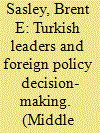

|
|
|
|
|
| Publication |
2012.
|
| Summary/Abstract |
This article seeks to contribute to our understanding of Turkish foreign policymaking, which is an under-developed area of study. It does so by examining the role of individual leaders in the foreign policymaking process. It compares two Islamist prime ministers - Necmettin Erbakan and Recep Tayyip Erdogan - and the difference in their levels of emotional attachment to Islam and their pragmatism. The findings are also relevant for a more informed understanding of the potential outcomes of the revolutions in the Arab world, where attention to Islamist groups and their preferences have become paramount.
|
|
|
|
|
|
|
|
|
|
|
|
|
|
|
|
| 8 |
ID:
114259


|
|
|
|
|
| Publication |
2012.
|
| Summary/Abstract |
The Six Day War intensified the Palestinian refugee problem as tens of thousands of Palestinians fled from the West Bank to Jordan's East Bank. The war created a new situation in which more than 50 per cent of the refugees who had been displaced from Israel in 1948 now lived in territories occupied by Israel. This gave rise to hopes that a solution could be found, at least for those refugees under Israeli rule. Officials in both the US and the UK proposed a variety of plans to this end. The article examines the different schemes and analyses the reasons why none of them was, in the end, implemented.
|
|
|
|
|
|
|
|
|
|
|
|
|
|
|
|
|
|
|
|
|